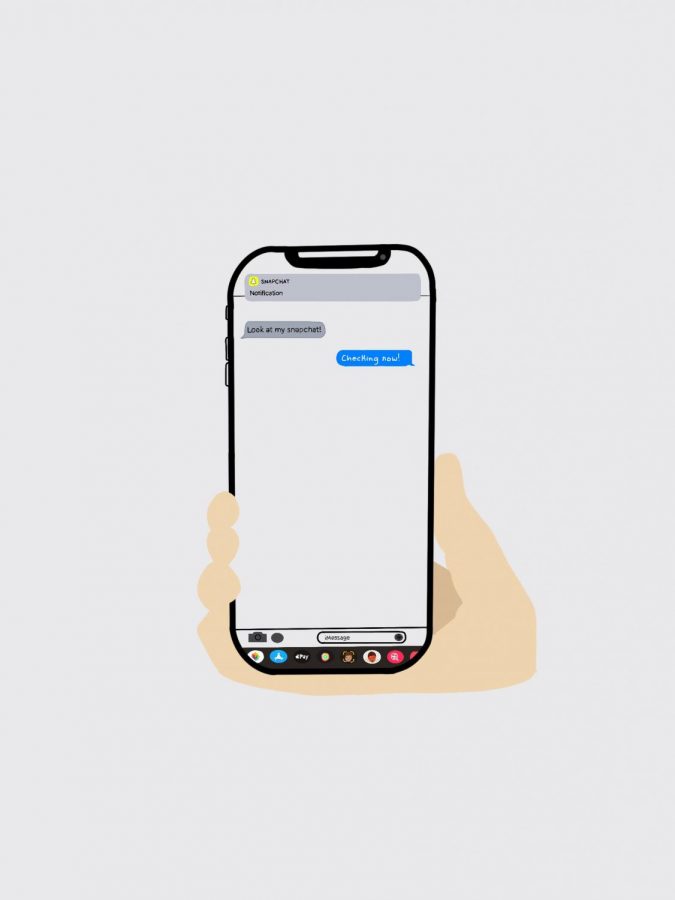Mother Versus Daughter Perspectives: Social Media’s Effect on Teenagers
Teens and their parents have different opinions surrounding social media and technology use. Staff illustration: Sutton Inouye.
February 9, 2021
Do teenagers really have an obsession with social media, or do our parents just not understand? I frequently get the screen time lecture from my mom. I’ll then explain how my phone and apps allow me to stay connected with my friends online, and usually, she’ll let me go. Yet today, I sat down with her and faced the conversation straight on: can we find a common ground, a generation apart?
When my mom was my age, her phone was plugged into the wall and sat on her nightstand. “Eventually, I upgraded to the iPhone when it came out, around 2007,” my mom told me.
Her first social media app was Facebook, an ancient and outdated app in the eyes of many Gen Z members. Today, however, she uses both Facebook and Instagram equally. “I like Instagram better because there is less political noise than on Facebook,” she said. “Instagram is more of the pictures and some brief information.”
I downloaded Instagram in seventh grade with my mom’s permission, but she regrets it. “That young? I’m a bad mother,” she said. “Social media can be toxic for kids, especially in middle school, and it makes more room for feelings to be hurt — like when they see their friends hanging out without them.”
A year later, in eighth grade, I downloaded Snapchat. According to Statista, with 46 million active users just in the U.S., Snapchat has developed into one of the most popular social media apps, especially for teenagers.
My mom has come around on Snapchat, but she was very hesitant about letting me download it a few years ago. “When [Snapchat] came out, all the parents were telling cautionary tales about how the photos disappear after you send them,” she said.
Although the photos do disappear after sent, they are usually just selfies sent back and forth; they’re unmemorable and unimportant. Business Insider estimates that the average person receives and replies to around 20-50 snaps per day.
I’ll admit that sometimes Snapchat seems useless, but it also keeps me connected with my friends and is more casual than iMessage.
However, my mom pointed out that Snapchat and other social media platforms create an environment of minimal accountability. “My least favorite part about Snapchat is that people feel like they can say things to someone that they would never say in person. People don’t put as much thought into what they’re saying. I guess this is true for all online interactions,” she said.
I can’t disagree with this one. Being behind a screen allows people to feel more confident in confrontations. And in the heat of the moment, teenagers and adults can say things they will later regret.
“I think kids are not as good at in-person social interactions now because of how your generation grew up with phones and social media,” she said. This goes for dating as well, she said.
“When I was in high school, you would have to pick up the phone and ask them out. There was no texting back and forth,” she said.
On top of this, our generation has spent the last year socially distanced from others due to COVID-19. If we were lacking in-person interactions before, we definitely are now. We spend more time in our homes, and technology is an escape for many.
I can’t compare my experience growing up with other generations, but I don’t doubt that Gen Z lacks social skills.
USA Today analyzed a survey by Cigna and wrote, “the Cigna survey found a huge difference in average loneliness scores between those who had daily meaningful in-person encounters and those who didn’t.” Both USA Today and Cigna attributed this increased loneliness to the teen use of social media.
I see where my mom is coming from, but then again, this is how our generation is. We revolve around the online world, and even if I deleted all social media, it doesn’t mean everyone else will. However, focusing on lowering our screen time could never hurt — but don’t let my mom know I said that.


